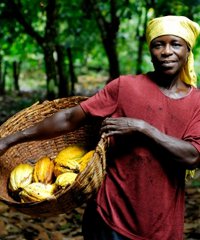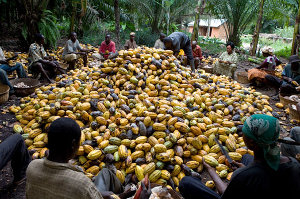A lot has been said about Ghana’s economy and the need to boost
agricultural production to feed the nation, provide jobs for the people,
stem rural-urban migration, reduce poverty and enhance the nutritional
needs of citizens. Sadly enough, little concerted effort has been made
by governments and stakeholders over the years to significantly develop
the nation’s agricultural industry.
Ghana has more arable land than most Western European countries yet
the country imports agricultural products from these countries. Ghana is
a net importer of almost every agricultural product ranging from rice,
wheat, soya bean, corn, poultry products (turkey tail, chicken, etc),
fish and fish products, beef, pork, pig feet, cow feet etc. The country
cannot continue to apply piecemeal approaches to solving this very
essential food importation problem. Over the years governments have been
in a hurry to implement various intervention programmes different from
those implemented by predecessor governments. Interestingly all the
interventions are either short termed or not sustained long enough to
ensure that results are achieved.>>continue>>
Sunday, February 12, 2012
Tuesday, January 3, 2012
Interview: Financing cocoa in Ghana
 Stanbic Bank Ghana this week confirmed that a record number of
commitments have been secured for Ghana Cocoa Board’s 17th annual
pre-export finance facility. Standard Bank was one of the joint mandated
lead arrangers (MLAs) for the US$1.2 billion transaction along with
Crédit Agricole, ICBC, Ghana International Bank and SMBC.
Stanbic Bank Ghana this week confirmed that a record number of
commitments have been secured for Ghana Cocoa Board’s 17th annual
pre-export finance facility. Standard Bank was one of the joint mandated
lead arrangers (MLAs) for the US$1.2 billion transaction along with
Crédit Agricole, ICBC, Ghana International Bank and SMBC.
Ghana's cocoa industry consists of thousands of small-scale farmers.
The transaction was oversubscribed at US$1.834 billion, and the
borrower increased the facility size to US$1.5 billion. A total of 28
banks, including the MLAs, confirmed participation, with ticket sizes
following scale-backs ranging from US$5 million to US$100 million.The structure of this deal remains unchanged, with the facility used to purchase cocoa beans for the 2010/11 season, and secured by the assignment of export contracts from overseas buyers.>>>more>>>
Saturday, November 12, 2011
Ghana's Floriculture Industry
 Investors have the opportunity to invest in the production of flowers in Ghana. The country’s floriculture industry is at an infant stage of development relative to Africa’s major flower producers.
Investors have the opportunity to invest in the production of flowers in Ghana. The country’s floriculture industry is at an infant stage of development relative to Africa’s major flower producers.Investment Opportunities
Ghana’s climate, topography, and other natural characteristics make it a conducive location for the cultivation of many exotic breeds of flowers.
Specifically, species such as heliconia, caribea, celocia, curcuma, gladioli and hibiscus have all performed well in Ghana under natural conditions, and there is potential for the expansion of areas under cultivation for these and other cultivars which have yet to be introduced.
Most of Ghana’s current producers possess basic resources – including large tracts of prime uncultivated land, basic technical know-how and an experienced labour force – which can be expanded with capital infusion and technology transfer. The expected growth in the floricultural sector will create and sustain demand for cold storage and freight handling facilities, greenhouse construction, irrigation equipment and construction of small dams.>>>continue>>>
Thursday, October 13, 2011
Food Security Ghana: When Governments Care
On Sunday 16 October 2011 the world will
celebrate World Food Day 2011 amidst a second global food crisis in less
than four years that has pushed millions more into poverty and many
millions globally into hardship. Government policies play a major role
in this crisis of immense proportions and Food Security Ghana (FSG)
takes a look at what caring governments do.
In 2008 Ghana Cared
In May this year Hafez Ghanem, assistant director-general at the United Nations’ Food and Agriculture Organization (FAO), said that government policy decisions contributed to the 2008 food crisis.>>>more
In 2008 Ghana Cared
In May this year Hafez Ghanem, assistant director-general at the United Nations’ Food and Agriculture Organization (FAO), said that government policy decisions contributed to the 2008 food crisis.>>>more
Monday, October 3, 2011
Lack of policies for local poultry industries in Ghana
The challenges of Ghana’s poultry industry according to some industry insiders are due to the failure of successive governments to draw up coherent policies to curtail the importation of poultry products into the country.
According to the former Chairman of the Ghana National Association of Poultry Farmers, Ken Quartey, the anticipated growth in the poultry industry has not materialized yet after several years now. This he said is seriously affecting the poultry industry >>>more
Monday, September 12, 2011
Addressing Ghana’s agriculture challenges
 Ghana’s
increasing population, changing weather patterns and global food price
hikes are squeezing the budget of the less well-off. Although
agricultural production has grown at over 5% annually since 2001, this
has largely been achieved by bringing new land into cultivation. Yield
gaps between Ghana’s productivity levels, compared to what is
achievable, are far too high.
Ghana’s
increasing population, changing weather patterns and global food price
hikes are squeezing the budget of the less well-off. Although
agricultural production has grown at over 5% annually since 2001, this
has largely been achieved by bringing new land into cultivation. Yield
gaps between Ghana’s productivity levels, compared to what is
achievable, are far too high.
Ghana's
cocoa farmers have enjoyed higher incomes for the current cropping
season and interventions are underway to improve soil fertility.
Tuesday, September 6, 2011
Food Security in Ghana
Over 1.2 million Ghanaians, representing five per cent of the population, are food insecure.
About 34 per cent of this population can be found in the Upper West with 15 per cent in the Upper East and 10 per cent in the Northern regions.
Mr Stephen Yakubu, Deputy Northern Regional Director of the Ministry of Food and Agriculture (MOFA) disclosed this when he delivered a paper on “Food Security in Northern Ghana: challenges and prospects” at a workshop by the Northern Ghana Food Security Resilience Project (NGFSRP) in Tamale on Thursday. >>> more
Subscribe to:
Posts (Atom)



